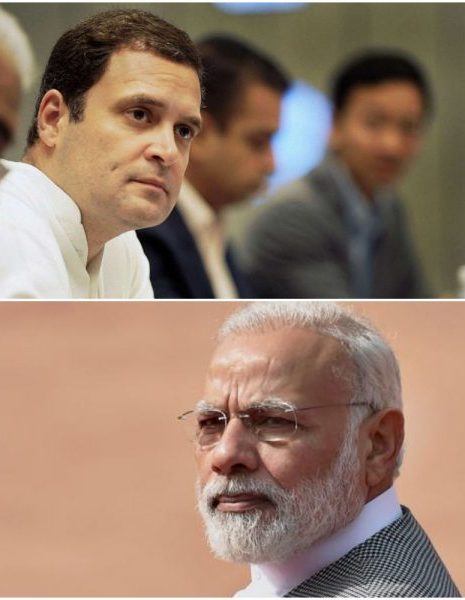
Team, plan & leader in place, BJP looks to be on vantage ground

Victorious warriors win first, Chinese philosopher Sun Tzu said, and then go to war. If you want to see this dictum in practice, watch the BJP war machine in action.
On March 10, when the Election Commission of India (EC) announced the schedule for Lok Sabha elections, the common perception — and this would be soon vindicated by a rash of opinion polls — was that the outcome of the next electoral war is a foregone conclusion; that it is all over bar the counting.
The BJP, in popular perception, in the chatter in newsrooms and charcha (discussions) on chai is the clear front runner. It has stitched up a rich tapestry of alliances — a mahagathbandhan of its own, ironed out differences with difficult partners like Shiv Sena, taken control of the narrative and already completed the first round of campaigning with a craftily created itinerary for the Prime Minister that allowed him to both inaugurate projects on government expenditure and castigate the Opposition as campaigner Narendra Modi. In essence, the BJP has the team, a war plan and a leader.
Opposition alliances a mess
Defeated warriors first go to war and then seek to win, Sun Tzu opined about losers, in the same breath. The Opposition, at the moment, is a perfect embodiment of his philosophy. On the eve of polls, its alliances are in a mess, aptly underlined by the off-today-on-tomorrow parleys between the Congress and Aam Aadmi Party in Delhi and the uncertainty in Uttar Pradesh, where the Congress still can’t decide whether to go it alone or join the SP-BSP team. Compared to the BJP, the Opposition is still trying to scramble a team, put together a cohesive plan, find an acceptable narrative and project a leader.
Three months ago, when the Congress defeated the BJP in Rajasthan, MP and Chhattisgarh; when the SP-BSP came together in UP, the 2019 appeared headed for a tight finish. Many opinion polls around that time suggested huge losses for the BJP in UP and a Congress resurgence in the Hindi heartland. Simultaneously, Congress president Rahul Gandhi’s relentless attack on Modi for his role in the Rafale deal also gave the Opposition new hope and renewed zeal.
With the benefit of hindsight, it can be argued that somebody in the Jaish-e-Mohammad headquarters had different plans for the BJP. A terror strike claimed by the JeM in Pulwama created circumstances for Modi to bring its favourite slogan—nationalism—back as the overarching narrative. The IAF bombing of a madrassa in Balakot and its smart politicization by the BJP helped it drown the Opposition voice and negate the SP-BSP caste math. As they say in cricket, the BJP is now playing on a turning track with a team of spinmeisters.
Apart from the poll pitch, many other things favour the BJP. The decision of the election commission to conduct polls in UP in seven phases gives Modi the opportunity to campaign in almost every corner, address a large number of rallies. For a party flush with money, this is a huge advantage. The Opposition, on the other hand, will find it financially and logistically difficult to sustain a campaign that will go on for more than two months.
Bigger problem
But, the bigger problem for the Opposition is this: What is it that it can say now to attract the attention of voter, alienate them from the BJP? Modi and his team would bombard TV channels, newspapers and social media with just one slogan: Modi hai to sambhav hai (If Modi is there, everything is possible). We saw a glimpse of the BJP’s strategy past week when the PM told his audience in Greater Noida, UP, that “Pakistan started crying, Modi hit us.” Notice the PM’s clever ploy of supplanting the IAF with Modi, positioning himself—not the armed forces—as the scourge of the enemy. How will the Opposition take on this muscular campaign, especially in an environment of euphoria over the Balakot strikes, even if their efficacy is still being debated?
The Congress is trying to hit Modi with charges of corruption in the Rafale deal. But, the problem with this strategy is that it has so far not been able to convince the electorate of Gandhi’s allegation of chowkidaar (watchman Modi) being chor (thief). In spite of the haze around the deal, the PM’s personal integrity is still not being questioned by voters. In addition, the BJP is trying to link the deal with national security, arguing that those opposed to it are favouring Pakistan. This is a specious argument, but in the marketplace of patriotism, anything can be sold.
What can the Opposition do now? Strategically, it does not have too many options—in an election dominated by slogans of nationalism, it can’t compete with the BJP. Mathematically, it can forge regional alliances by realizing that every seat counts, especially in UP, Delhi and West Bengal where the BJP can be decimated by a combined Opposition. Philosophically, it can just hope that Sun Tzu was wrong and a war can be won even by an ill-prepared army, with no strategy and without a leader. Miracles happen, no?

